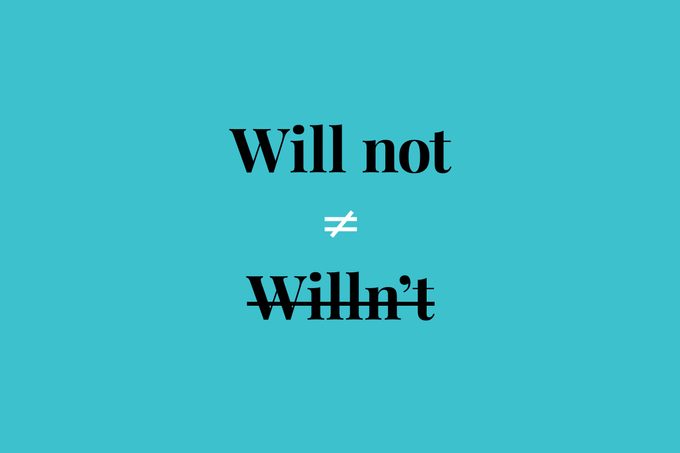Discover why won't won the contraction race over will not

Here’s Why the Contraction for “Will Not” Isn’t “Willn’t”

We sure love contractions, don’t we? Whether we’re talking or writing, we’ll do almost anything to get our point across faster. Just think about it: don’t, can’t, I’m, he’ll—they all follow a pretty clear pattern. But then comes won’t, and the grammar rules get confusing. If we formed it like most contractions, we’d say willn’t. But we don’t. So how did we end up with won’t as the will not contraction?
Well, as a longtime copy editor and proud word nerd (no shame in my game), I had to find out. I turned to two language experts—Michael Adams, PhD, a professor of English and linguistics at Indiana University, and Jess Zafarris, an etymology expert—to unravel the mystery of this stubborn little word. Read on for an explanation you won’t want to miss.
Get Reader’s Digest’s Read Up newsletter for more grammar, humor, travel, tech and fun facts all week long.
Why doesn’t English use willn’t for the contraction of won’t?
The short answer: Willn’t just doesn’t work phonetically. It’s too difficult to pronounce, while won’t rolls off the tongue much more smoothly.
“We can’t easily say willn’t,” Adams explains. “This gets a little technical, but it’s not rocket science. You’ve got this ridge at the front of your mouth, which is called the alveolar ridge. When you make the n nasal sound, your tongue goes right to that ridge, and when you say l, it goes right to that ridge as well.”
“So, willn’t wasn’t going to work,” he adds. “You’re either gonna lose the l, as it assimilates into the n, or you’re going to delete the n to preserve the l, but you can’t have it both ways. It was going to become wilt or wint or wilt.”
In short, won’t became the practical workaround. “It’s not the obvious alternative,” Adams admits, “but it’s one way of getting around all these phonetic complications.”
What is the etymology of won’t?

So if it’s not short for will not, where does won’t come from? Won’t is actually a holdover from an older form of the verb will, meaning “to want” or “to wish.”
“It’s a vestige of Old English conjugations,” says Zafarris. “The base infinitive was willan. Its first-person singular form in present tense was will, and the first-person singular past tense was wolde.”
To make matters more confusing, Zafarris notes, “spelling varied wildly, and that continued into Middle English.”
Adams agrees. “We’ve got evidence in the 16th century of will not becoming woll not with an o,” he says. “We even have examples from that period of a form that we would recognize today: wonnot, which shows how it’s going in the direction of a contracted form. Now, of course, it’s all one syllable, and we just say won’t.
In other words, today’s won’t is most likely a streamlined descendant of wonnot, which was itself the combination of woll (a variant of will that we no longer use) and not. Got all that?
What are contractions?
According to the Oxford English Dictionary, a contraction is the action of contracting or shortening (a word, a syllable, etc.) by omitting or combining some elements. Most standard English contractions use an apostrophe to indicate omitted letters (for example, in she’s, the apostrophe takes the place of the letter i).
Fun fact: According to Zafarris, “the word apostrophe means to turn away. Essentially, it means that a letter or letters are being turned away or removed from the word.”
How do contractions evolve in language?
Contractions typically evolved through speech first, not writing. People speak quickly and naturally clip commonly used word pairs. Over time, these shortened versions catch on and become standard. That’s why we get don’t from do not, I’m from I am and so on.
But not all contractions follow perfect logic. Some, like won’t, are linguistic leftovers from older forms of verbs or dialectal quirks. Somehow ain’t came from am not—another strange grammatical detour.
Willn’t probably won’t come back into fashion because won’t is so ingrained in English usage that it’s here to stay. But it’s interesting to know why we don’t say it.
About the experts
|
Why trust us
At Reader’s Digest, we’re committed to producing high-quality content by writers with expertise and experience in their field in consultation with relevant, qualified experts. We rely on reputable primary sources, including government and professional organizations and academic institutions as well as our writers’ personal experiences where appropriate. We verify all facts and data, back them with credible sourcing and revisit them over time to ensure they remain accurate and up to date. Read more about our team, our contributors and our editorial policies.
Sources:
- Michael Adams, professor of English and linguistics at Indiana University Bloomington and author of Slayer Slang: A Buffy the Vampire Slayer Lexicon; phone interview, May 16, 2025
- Jess Zafaris, etymology expert, founder of Useless Etymology, co-host of the Words Unravelled podcast and author of several books, including Words from Hell; phone interview, May 21, 2025
- Oxford English Dictionary: “Will”
- Oxford English Dictionary: “Contraction”





















